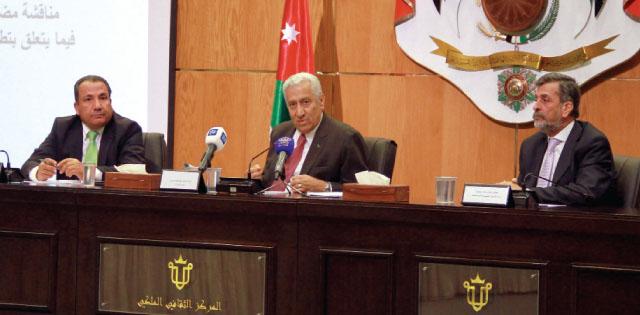You are here
Stakeholders share views on public sector reform
By Omar Obeidat - Nov 25,2014 - Last updated at Nov 25,2014

AMMAN – Officials, representatives of political parties and unionists gathered on Tuesday to discuss ways to develop public sector performance based on His Majesty King Abdullah’s discussion papers.
Prime Minister Abdullah Ensour, Public Sector Development Minister Khleef Al Khawaldeh and Minister of Political and Parliamentary Affairs Khaled Kalaldeh, in addition to business sector and NGO representatives attended the workshop, organised by the Ministry of Public Sector Development.
Khawaldeh said the session aimed at listening to the views of all segments of society on reforming public administration, a topic the King tackled in his discussion papers.
Since December 2012, the King has issued five discussion papers that aim at facilitating a national conversation around Jordan’s reform roadmap and democratic transformation.
In the discussion papers, the King stressed the need to improve the professional performance of government agencies and adopt good governance and transparency, in addition to highlighting the importance of public-private sector partnership, the minister said.
The papers also underscored the need to improve the quality of services offered to the public, develop human resources, upgrade decision-making mechanisms and prepare long-term strategies for improving public sector performance.
Before participants started their dialogue, Khawaldeh briefed them on the government’s efforts to translate the content of the papers into actions, such as upgrading the regulations governing the work of public agencies, applying best standards in human resources management, issuing a law to restructure government entities and implementing measures to boost the quality of services.
The prime minister said the King is the first world leader who offers ideas for discussion by the public.
“This session is important because it is critical to discuss whether the size of the government sector is healthy and if is overstaffed with unneeded jobs,” Ensour said.
He added that it is also vital to discuss the role of the government sector today, noting that it is 93 years old and needs to be reviewed.
Saleh Irsheidat, secretary general of the National Current Party, said King Abdullah is the only leader in the world to issue initiatives and discussion papers to reform state administration, expressing his appreciation of the Public Sector Development Ministry for organising such an event.
“Public confidence in government agencies has deteriorated over the years,” Irsheidat said, noting that restoring public trust is a shared responsibility of the government, Parliament and political parties.
Abdul Nasser Abu Ajamiyeh, from the Jordan National Party, believes that the “low” salaries of public servants is the main problem hindering the development of the public sector.
“How can employees improve their performance while their salaries are not enough to meet their living needs?” he asked, adding the government should focus on improving the income of civil servants before drawing up strategies to develop services.
Ahmad Shunnaq, secretary general of the National Constitutional Party, said the government should prepare a map showing the number of people receiving government services in each district of the Kingdom, explaining that in some areas public agencies are crowded with large numbers of people seeking to complete their transactions.
“There should be certain windows to serve Jordanians only and other windows for non-Jordanians,” Shunnaq said, calling for cancelling the Civil Service Bureau and the Labour Ministry and creating a ministry for employment instead that works on securing jobs for Jordanians in public and private organisations.
He said that the government should restore the reputation of the public sector, once known for its professionalism, noting that Jordan helped several Arab countries establish advanced public administration systems.
Maher Arabiyat, from the Reform Party, said the state should invest in boosting the administrative knowledge of its employees as experience is sometimes not enough to produce quality services.
Arabiyat also called for a permanent strategy that all governments should follow to develop public sector performance.
Related Articles
AMMAN — Six political parties which have recently formed a new political movement have mostly centrist ideologies that seek to achieve refor
Public Sector Development Minister Khleef Al Khawaldeh on Wednesday met with a delegation of EU experts currently visiting the Kingdom and discussed drafting a procedural document for a new programme for the country’s financial and public sector reform, according to a ministry statement.
Public Sector Development Minister Khleef Al Khawaldeh and Health Minister Ali Hiasat on Wednesday discussed ways to improve services offered to the pharmaceutical sector.
















